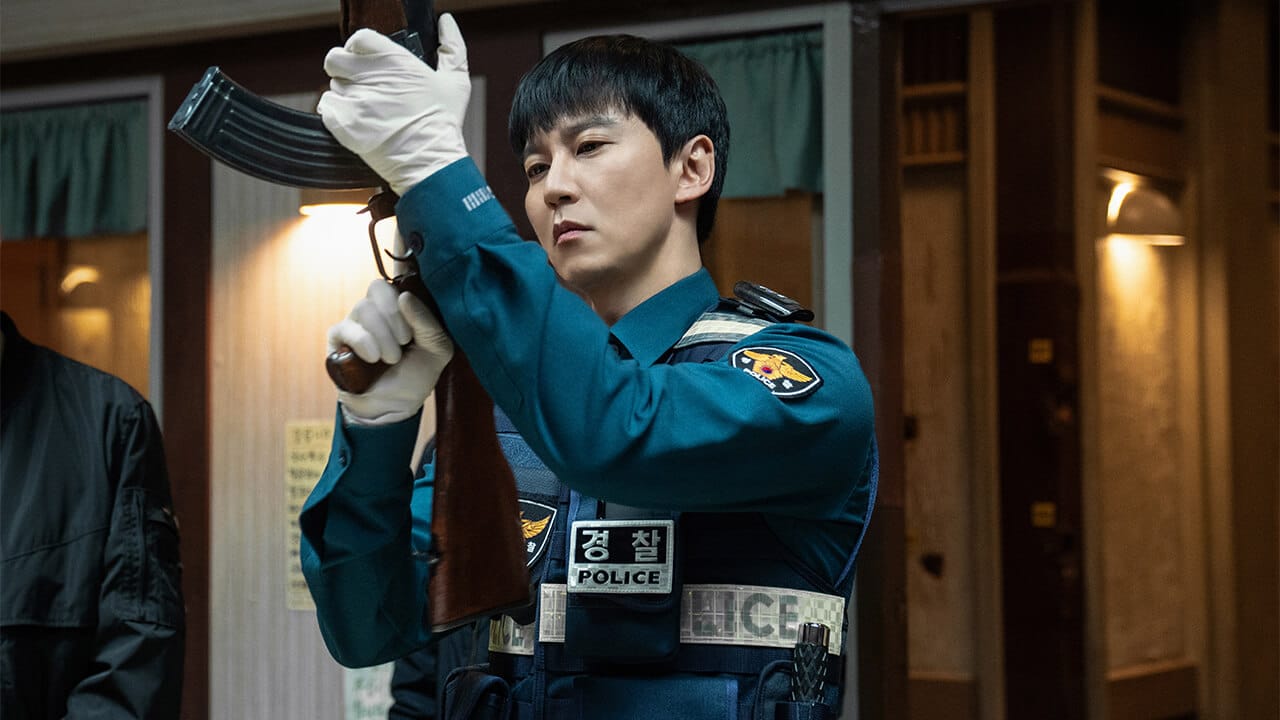Juan Mayorga’s Los yugoslavos [The Yugoslavs] is, to-date, the only one of the acclaimed Spanish playwright’s plays to have opened in translation. First performed at Belgrade’s Bitef Teatar (Serbia) in 2013, and followed by Argentine stagings, Los yugoslavos arrives now to Madrid’s Teatro de la Abadía – where Mayorga is also Artistic Director – under the direction of the playwright in what is its Peninsular premiere.
Set in an unnamed metropolis – though perhaps Madrid – Los yugoslavos is one of Mayorga’s more mysterious works. The eponymous country is less a geographic reference than an evocation of what is called, in Serbo-Croatian, čežnja – a deeply-held yearning or desire. Stronger than nostalgia and softer than the Portuguese saudade, čežnja is an ache without a cure and it is, frequently, existential. Rather than a country, Yugoslavia is here a feeling, an urge to grab hold of what remains just out of reach.

Javier Gutiérrez as Martín in Juan Mayorga’s Los yugoslavos at Madrid’s Teatro de la Abadía. Photo: Javier Mantrana.
The play is mathematical in structure, Bergmanesque in mood. It investigates the ruins of a failed marriage with the cool remove of a professional excavation. At the centre of the play is Martín, the lost owner of a family bar, around whom orbit three others, equally lost: Ángela, Gerardo, and Cris. In the opening minutes, we discover that that Ángela, Martín’s wife, has entirely stopped speaking. Neither does she come to the bar, where she has worked for decades alongside her husband. Martín has no reasonable explanation for her sudden mutism. All he knows is that she leaves the house every day, knowledge gained by the imprints he sees left on the undersoles of her shoes. In a desperate bid to solve the puzzle of his wife’s silence, Martín enlists the help of Gerardo, a man he sees successfully placate another customer in his bar, distraught after being fired from his job. Martín hires Gerardo to follow Ángela, hoping that in discovering where she goes each day, he will, in turn, get one step closer to recovering their marriage. As Gerardo trails Ángela around the city, several unusual figures and spaces appear: abandoned bars, a Yugoslav map, Gerardo’s teenage daughter, Cris. The more Gerardo comes to know Ángela’s movements and characteristics, the more intrigued he becomes. Meanwhile, Martín appears increasingly unwell: he compulsively alludes to chairs and tables that are off-balance, folding and unfolding his waiter’s vest with religious precision. As it happens, maybe it’s not such a good idea to pay a (hot) man to stalk your (sad) wife.
But while this opening gambit may hint at Vertigo, the play is less a thriller than it is a descent into the limits of communication within the broader context of love, whether romantic or otherwise. There is something Lawrentian I found here – although perhaps Mayorga would disagree – in the constitutional inability between man and woman to understand each other, despite eternal endeavours to the contrary. This is highlighted in the fragile, extended silences between Martín and Ángela, but also, in a more youthful and frustrated form by Cris, Gerardo’s daughter. Frequently placed in an alcove at the upper right of the stage, Alba Planas’ rebellious yet pensive Cris calls out to her father, searching for some sort of connection with him that he is unable to offer.


Alba Planas as Cris in Juan Mayorga’s Los yugoslavos at Madrid’s Teatro de la Abadía. Photo: Javier Mantrana.
Mirror images and strange, distorted reflections abound. In one poignant moment, Cris arrives to Martín’s bar in search of her father, and unintentionally mimics the language employed by Ángela decades prior, on the day the couple first met. A similarly arresting through-line concerns a lost-and-found box in the bar, the contents of which Martín guards jealously and preciously. He keeps objects customers have accidentally left behind for years, confident in his belief that their rightful owners ‘will always return’.
The performances of the four cast members are precise and convincing; Mayorga and movement director Marta Gómez entangle them in a delicate, contrasting choreography. Luis Bermejo’s Gerardo prowls around the stage with an attractive virility that recalls John Wayne, sharply distinguished from Javier Gutiérrez’s anxious, meek Martín. Alba Planas is a glass of fresh water amid the gloom, injecting energy and verve in her few scenes. Natalia Hernández offers a cinematic Ángela who feels constantly on the verge of a complete breakdown and yet, somehow also, entirely in control. Gutiérrez creates an impressively sympathetic, three-dimensional character who could easily have become a pastiche of neuroses. The acting is supported by intelligent, bold moves from the artistic team. Musical direction by Jaume Manresa provides a fittingly eerie tone to the piece, elevating it from the casual and every-day to something suggestively sinister. The costume and set design by Elisa Sanz is arresting and, as with the music, just beyond realist – Ángela appears in all mauve and then bright red, straight out of a Marnie nightmare; Gerardo’s dark, cool shades hint at a danger lurking beneath the surface.
When the reasons for Ángela’s silence are revealed in the final act, Martín must decide whether he is prepared – or even capable – of offering her what she needs. While those hoping for a neat resolution may leave unfulfilled, from my vantage point, this seemed precisely the point. The characters are real, life-like, but their circumstances like that of a dream that blurs upon awakening. Mayorga sketches the contours of relationships in an impressionistic mode that allows for one to fill in the gaps, or indeed leave them bare. I was reminded of Yeats’ Ephemera, which offers a similarly open-ended image of the autumn of a relationship – or, perhaps, the autumn of a lost country:
“Your eyes that once were never weary of mine
Are bowed in sorrow under pendulous lids,
Because our love is waning.”
And then She:
“Although our love is waning, let us stand
By the lone border of the lake once more”[i]
Measured, sharp, and disquieting, Los yugoslavos looks upon this border, too.
Los yugoslavos performs at the Abadía until 6 July 2025, after which it will tour Spain. Link for tickets here.
[i] W. B. Yeats, ‘Ephemera’, in The Collected Works of W. B. Yeats: The Poems, ed. by Richard J. Finneran (New York: Macmillan Publishing Company, 1989), p. 15.
This post was written by the author in their personal capacity.The opinions expressed in this article are the author’s own and do not reflect the view of The Theatre Times, their staff or collaborators.
This post was written by Alma Prelec.
The views expressed here belong to the author and do not necessarily reflect our views and opinions.















